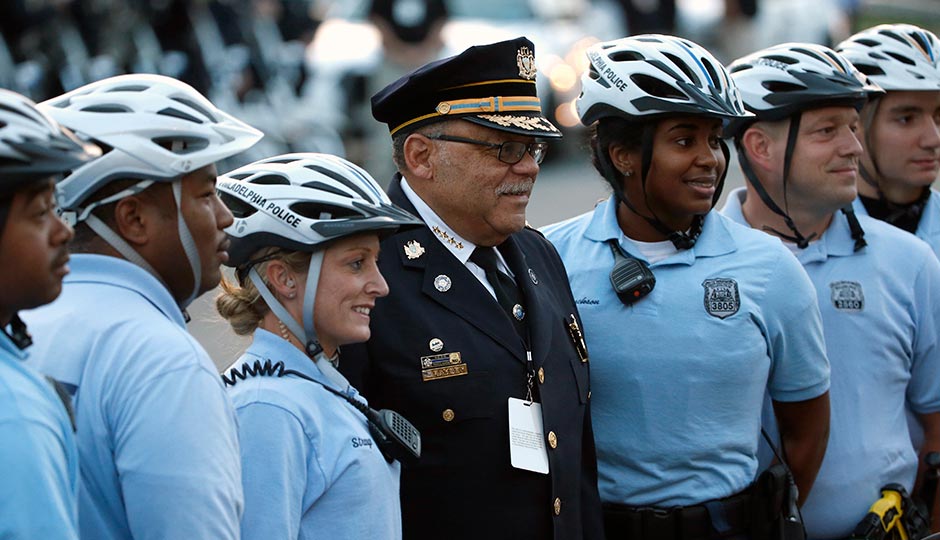Charles Ramsey’s Bottom Line: More Good Than Bad

Philadelphia Police Commissioner Charles Ramsey poses with other police officers Saturday, Sept. 26, 2015, in Philadelphia. (AP Photo/Pablo Martinez Monsivais, Pool)
So how do we assess Charles Ramsey’s Philadelphia career?
The police commissioner announced today that he is retiring at the end of the year, finishing out a tenure that began when then-Mayor-elect Michael Nutter nominated him for the job in November 2007 — coming out of retirement after an eight-year tenure as the top cop in Washington D.C.
Three themes emerge from Ramsey’s time in Philadelphia:
• The city’s murder rate went way down. For a lot of Philadelphians, this will be the only measure that matters. It’s arguable how much Ramsey had to do with this: Violent crime has been dropping across the United States for years — down by half since its national peak in 1991 — and at least one local criminologist argues that the murder rate is the wrong metric for measuring a city’s safety.
But it’s the metric most people — politicians, especially — use, and Ramsey is well-positioned to take the credit: After peaking at 406 homicides in 2006, there were 248 in 2014, the second straight year of fewer than 250 killings in the city. That’s still too many; the city’s per capita homicide rate is still far too high.
Still, it remains the fact that homicides declined almost 40 percent in a few years. That, combined with the influx of millennial professionals and a burst of construction activity that is reshaping our skyline, helped contribute to the sense of a modest Philly renaissance in recent years — a bit of optimism that can be rare for these parts.
• He played an unending game of whack-a-mole with police corruption. Ramsey may have had an impossible task on this front: Although he was plenty willing to fire cops accused of brutality and other abuses of power, the actions proved meaningless: Short of a conviction or a positive drug test, it proved nearly impossible during Ramsey’s reign to actually lose your job as a police officer for the City of Philadelphia: NBC Philadelphia noted two years ago that 90 percent of officers fired by Ramsey got their jobs back after arbitration.
The face of this? Lt. Jonathan Josey, the former “Sexy Single” who was caught on camera slugging a much smaller woman … and still got his job back, with back pay, months later.
Ramsey sometimes seemed angry about this: “There are some cases where, in my opinion, a person has really lost their right to be a police officer, to enforce laws, because they themselves have broken laws,” he said. But he also seemed to accept the results of the broken system too easily at times. “If you or someone out there has a better idea, it’s certainly something I’d be more than willing to listen to,” he told Helen Ubiñas in July. It felt a bit like passing the buck.
On the other hand …
• Ramsey started the police reform effort here before anybody heard of Ferguson. And he may have kept Philly from enduring the pain and chaos that other cities suffered once anger built.
Remember, Ramsey invited the Justice Department to investigate his department after Philly.com noted police-involved shootings here were going up even as crime was going down, and he did so before the anger unleashed by Ferguson would’ve otherwise made such a measure necessary. That set in motion a process that could lead to a widespread transformation of how the Philadelphia Police Department operates — and, hopefully, the defensive culture that undergirds the worst excesses of individual officers. It’s a shame that Ramsey won’t see that process through to its conclusion.
What’s more, once the #blacklivesmatter protests started, I’m firmly of the belief that Ramsey’s choices kept those protests from escalating into violence and mass arrests, as they did elsewhere in places like Baltimore. Cops weren’t allowed to dress like soldiers, but they were frequently reminded of the protesters’ First Amendment rights — and while there were individual skirmishes here and there, it’s simply not the case that neighborhoods burned here. “If we’re not the story at the end of the day, that’s a success,” he told me in May.
But Ramsey may have also compounded the public’s distrust of the police at a critical moment. When Brandon Tate-Brown was shot by officers last December, the official department narrative was that he was reaching inside his car for a gun. Video disproved that assertion — Tate-Brown was near the rear of his vehicle — something his department didn’t admit until six months later. Ramsey continued to assert the shooting was still justifiable, but the department’s “internal communications problem,” as he called it, didn’t help the cause.
So what’s the bottom line?
The truth is, you have to grade Ramsey on a bit of a curve. The police department has long had a famously fraught relationship with the city it serves, and no one commissioner will be able to completely transform either the department or that relationship. But he made some genuine efforts, got crime down, and started a process that — knock on wood— could bear genuine results in the future. It’s notable that many of Ramsey’s critics often seemed to have a grudging appreciation for him. So for now, though, the judgment is this: There’s more good than bad in Ramsey’s record. He set a standard the next police commissioner will be expected to meet and — hopefully — exceed.
Follow @JoelMMathis on Twitter.


